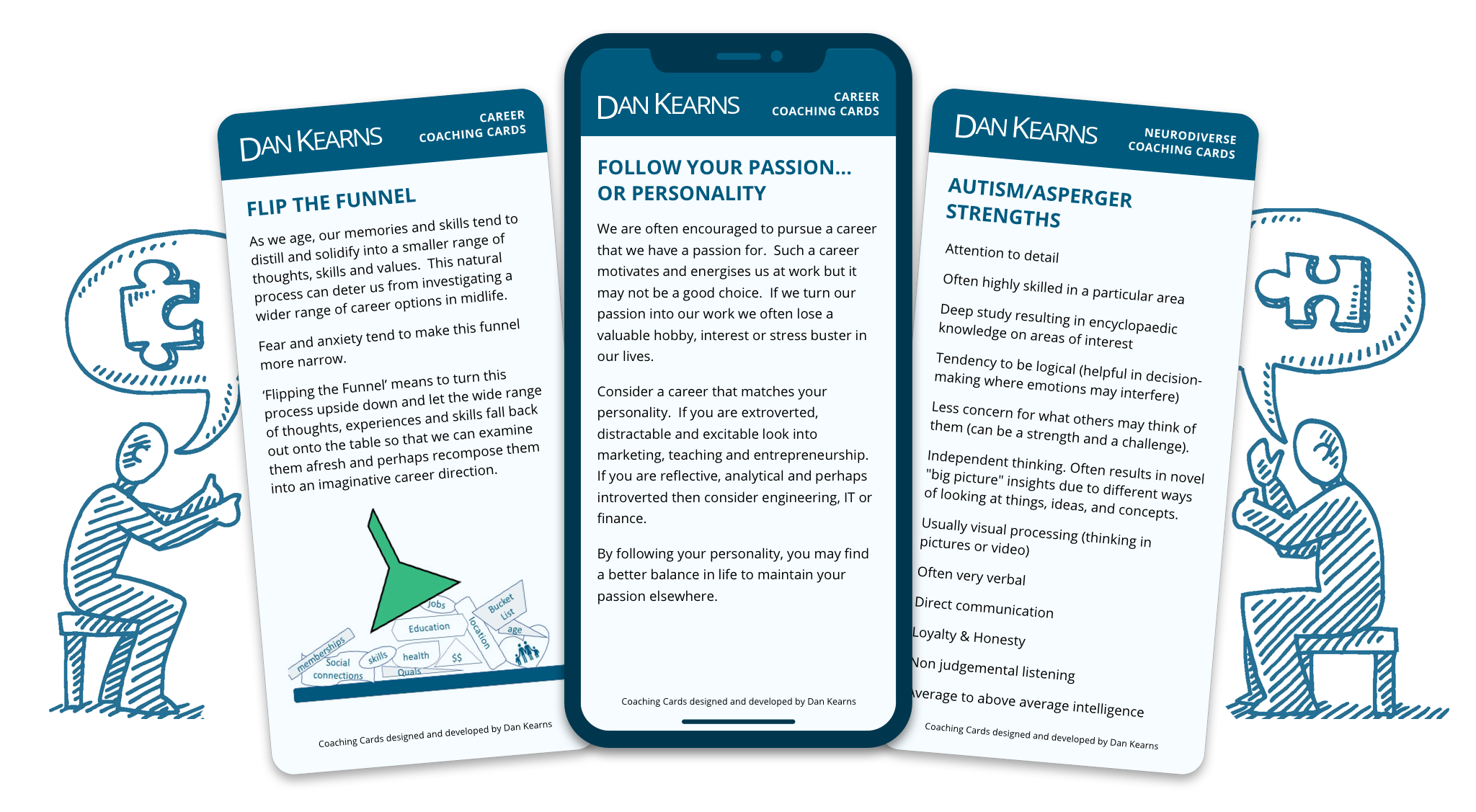I do understand the career strengths and challenges of people with an autistic/Aspergers profile.
I am self-diagnosed with an autistic/Aspergers profile. This then explained my personal struggles with employment over the last 45 years. For example, I was highly valued by the Navy for my technical skills but I struggled with authority. I enjoyed academia for a few years, however, I struggled with the competitive culture.
I was a creative leader in my management roles and very successful in developing new training and employment programs but I didn’t enjoy managing people. I was on the Australian Disability Advisory Council as the Queensland representative and chaired the Queensland Disability Advisory Committee to the Queensland Dept of Training and Employment in the early 2000s.
Just like it is important for me to look back on my own strengths and chaIlenges in the workplace, I am willing to discuss your own strengths and challenges that we can work with. You may identify with some of the traits outlined below. List courtesy of AANE. https://www.aane.org/asperger-profile-strengths/
Possible Strengths:
Intelligence, Special Interest, Memory
- Average to very high intelligence.
- Good verbal skills; rich vocabulary.
- Ability to absorb and retain large amounts of information, especially about topics of special interest.
- Ability to think in visual images.
- Be self-motivated, independent learners.
- Propensity to think outside the box and generate novel solutions to problems.
- Some people may show a strong aptitude for a particular field of study or topic.
Strong Focus
- Ability (in some cases a preference) for spending time alone.
- Take an interest in arcane or off-beat fields of knowledge.
- Concentrate for long periods of time on reading, experimenting, writing,
- Avoid wasting time in some activities that appeal to neurotypical people.
- Some special interests can be channeled into productive hobbies or even careers, where the person may be creative or make new discoveries.
Detail-oriented
- Ability to notice small details of an idea, theory, number pattern, book, film, object or visual image.
- Ability to perform repetitive tasks where accuracy, rules and routine are important.
- Strong work ethic; commitment to quality and accuracy of work.
Unique humor
- Play with language and create puns.
- Enjoy sarcasm and satire.
- Relish life’s absurd, dark, or incongruous side.
- See through empty rhetoric or conventional pieties.
Honesty
- Ability and tendency to tell the truth—even if it’s not tactful or in one’s self-interest.
- Desire and tendency to follow rules.
Desire to Connect
- Expend effort and energy to learn social skills that do not come naturally.
- Persevere in the face of rejection, confusion or frustration.
- Believe the best of everyone (sometimes naively).
- Accept quirkiness or imperfection in others, and become a loyal friend.
Fair and Just
- Tendency to be unconventional, open-minded, and tolerant.
- Intensely responsive when made aware of injustice.
- Advocate for the underdog, victims of bullying or member of an oppressed group.
- Propensity to express caring in non-traditional ways.
- Tendency to relate to and defend animals.
Possible Challenges:
Sensory Regulation
- Aversion to or craving for certain types/intensities of sensory input. Extreme sensitivity — or relative insensitivity — to sights, sounds, smells, tastes, or textures. Many people outgrow these sensory issues at least to some extent as they mature.
- Integrating multiple sensations and responding appropriately.
- Knowing where one’s body is in space; avoiding bumping into people or objects.
- Motor planning (using the body to accomplish a task).
- Auditory, visual, or intellectual processing, which can contribute to difficulties keeping up in a range of social settings.
Regulation of Emotions and Anxiety
- Recognizing what emotions feel like and look like in self and others.
- Understanding gradations of emotion; matching emotional response to people, activities and settings.
Regulation of Attention and Impulses
- Controlling flight or fight response when anxious.
- Filtering out extraneous stimuli.
- Analyzing relevant vs. irrelevant information.
- Sustaining attention to relevant information.
- Switching attention from one thing to another.
- Intense, narrow, time-consuming personal interest(s) — sometimes eccentric in nature — that may result in social isolation, or interfere with the completion of everyday tasks.
- Vulnerability to stress, sometimes escalating to psychological or emotional problems including low self-esteem, depression, anxiety or obsessive-compulsive behaviors.
Flexible Thinking
- Coping with changes in familiar routines.
- Seeing more than one way to accomplish a task/solve a problem.
- Realizing there are exceptions to rules; tolerating when other people bend rules.
- Accepting feedback, advice, suggestions or help from others.
- Change may trigger anxiety, while familiar objects, settings, and routines offer reassurance. One result is difficulty transitioning from one activity to another: from one class to another, from work-time to lunch or from talking to listening.
Central Coherence/Generalization/Main Idea
- Seeing “the forest for the trees.” Seeing the big picture due to a tendency to focus on the details of a given situation.
- Abstracting the main idea from text or conversation.
- Recognizing and categorizing information.
- Understanding complex or abstract concepts.
- Generalizing skills from one setting to another.
Executive Functioning/Problem-Solving:
- Organizing thoughts and materials.
- Written expression.
- Time management.
- Prioritizing, initiating, and completing tasks.
- Generating novel or alternative solutions.
Theory of Mind/Perspective Taking:
- Recognizing and understanding other people’s thoughts, feelings, and intentions due to a tendency to ignore or misinterpret such cues as facial expression, body language and vocal intonation.
- Processing social information quickly and efficiently.
- Being tactful; being able to tell “white lies.”
Hidden Curriculum:
- Understanding the unwritten or implied social rules.
- Knowing what to do or say in various social situations.
Social Pragmatics:
- Appearing awkward or rude, and unintentionally upset others.
- Noticing and correctly interpreting other people’s nonverbal communication (gestures, body position, facial expression and tone of voice).
- Modulating one’s own nonverbal communication.
- Initiating, joining, and maintaining conversation.
- Using humor and sarcasm appropriately; understanding other people’s use of sarcasm and humor.
- Feeling somehow different and disconnected from the rest of the world and not “fitting in” — sometimes called “Wrong Planet” Syndrome.
Self-Awareness/Self-Advocacy:
- Perceiving and expressing one’s own feelings.
- Understanding/accepting one’s own strengths and weaknesses.
- Developing strategies to offset weaknesses and build on strengths.
- Knowing when one needs help; asking for help.
- Recognizing and protecting oneself from bullies.
Chronic Fatigue:
- Difficulties with sleep patterns.
- Fatigue due to sensory stimulation in certain environments.
- Fatigue due to conscious mental processing of information that others might process intuitively.
- Exhaustion due to easily-triggered nervous system (active “Fight or Flight” response).
Digital Coaching Cards
I do understand the career strengths and challenges of people with an autistic/Aspergers profile.
I am self-diagnosed with an autistic/Aspergers profile. This then explained my personal struggles with employment over the last 45 years. For example, I was highly valued by the Navy for my technical skills but I struggled with authority. I enjoyed academia for a few years, however, I struggled with the competitive culture.
I was a creative leader in my management roles and very successful in developing new training and employment programs but I didn’t enjoy managing people. I was on the Australian Disability Advisory Council as the Queensland representative and chaired the Queensland Disability Advisory Committee to the Queensland Dept of Training and Employment in the early 2000s.

Many clients who identify with autistic/Aspergers struggle with the levels of ‘talk and text’ involved in face-to-face coaching and gravitate to my video coaching and digital resources and graphics.
Specifically focussed on autism/Asperger issues, I have developed sixty digital Coaching Cards that each cover a strategy or concept followed by suggestions or examples for its use. These cards are sent in a photo format designed to fit a single screen on the phone or tablet. They can be sent after a support meeting or discussed during the meeting online.
I find that these Cards enhance working life, work relationships and in general help the client with an autistic/Aspergers profile to navigate ‘the neurodiverse world of work’.
Free coaching cards and other resources available in the News & Resources section of my website below:

Meet Dan
I began my work life at 16 when I joined the Australian Navy as an Electronics Technician. On leaving the Services, I trained in disability studies to then develop and implement some successful community-based disability employment programs.

Testimonials
“ Dan understands my history and my struggles ”
” It is good to work with someone who is interested in my journey ”
“ Dan is very creative and if Plan C doesn’t work we go to Plan D,E,… ”
